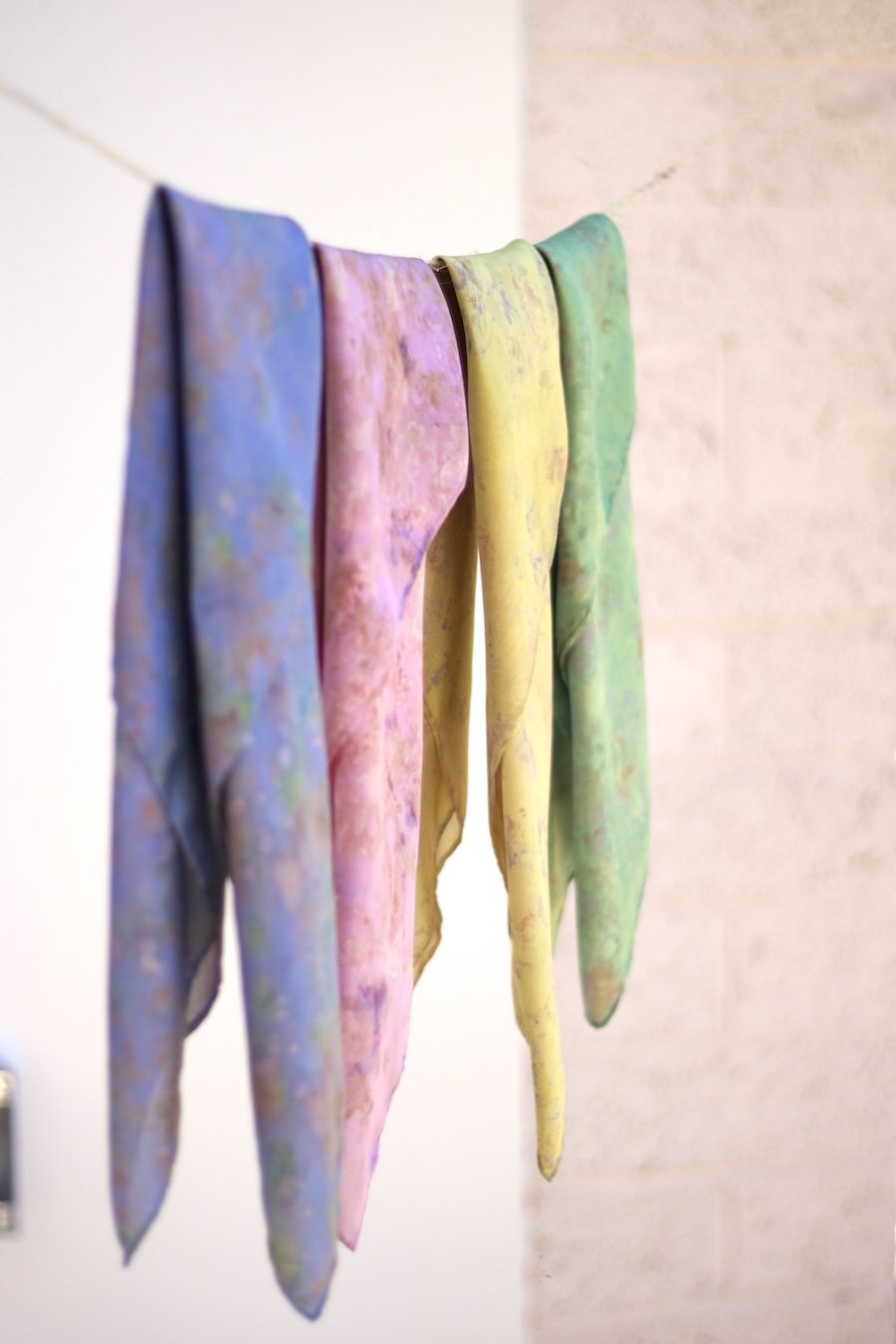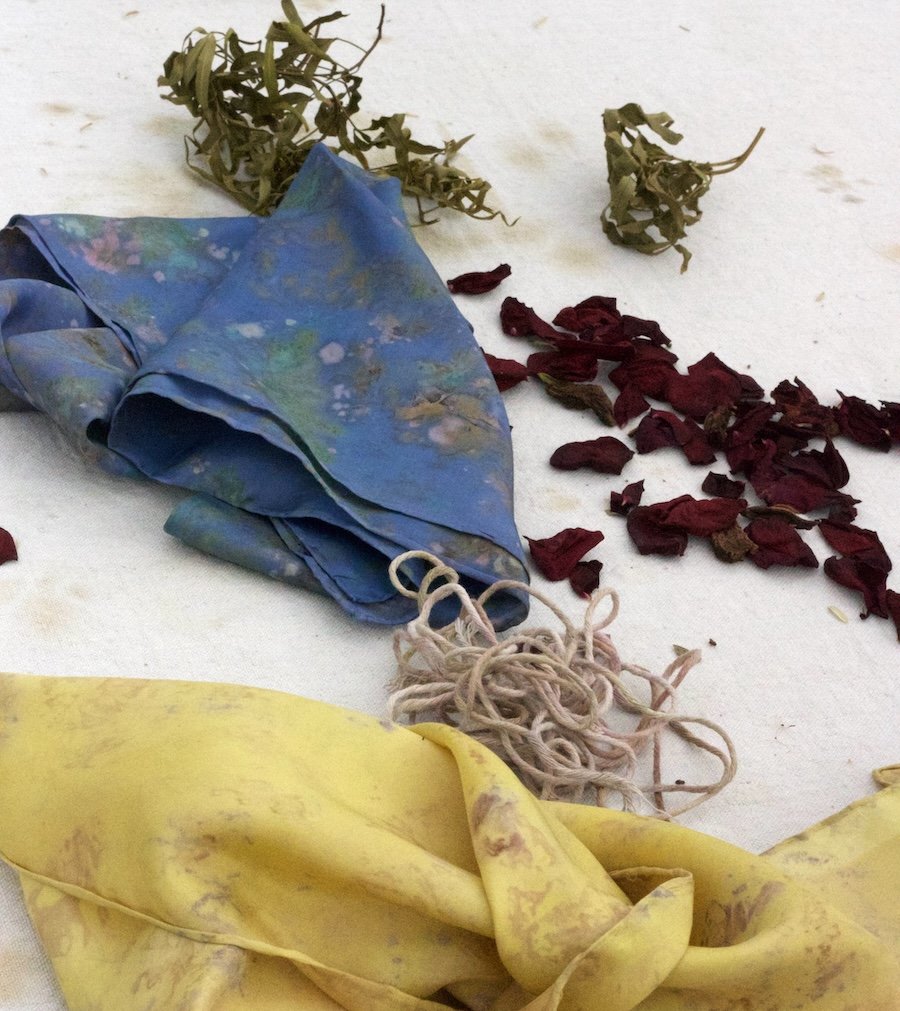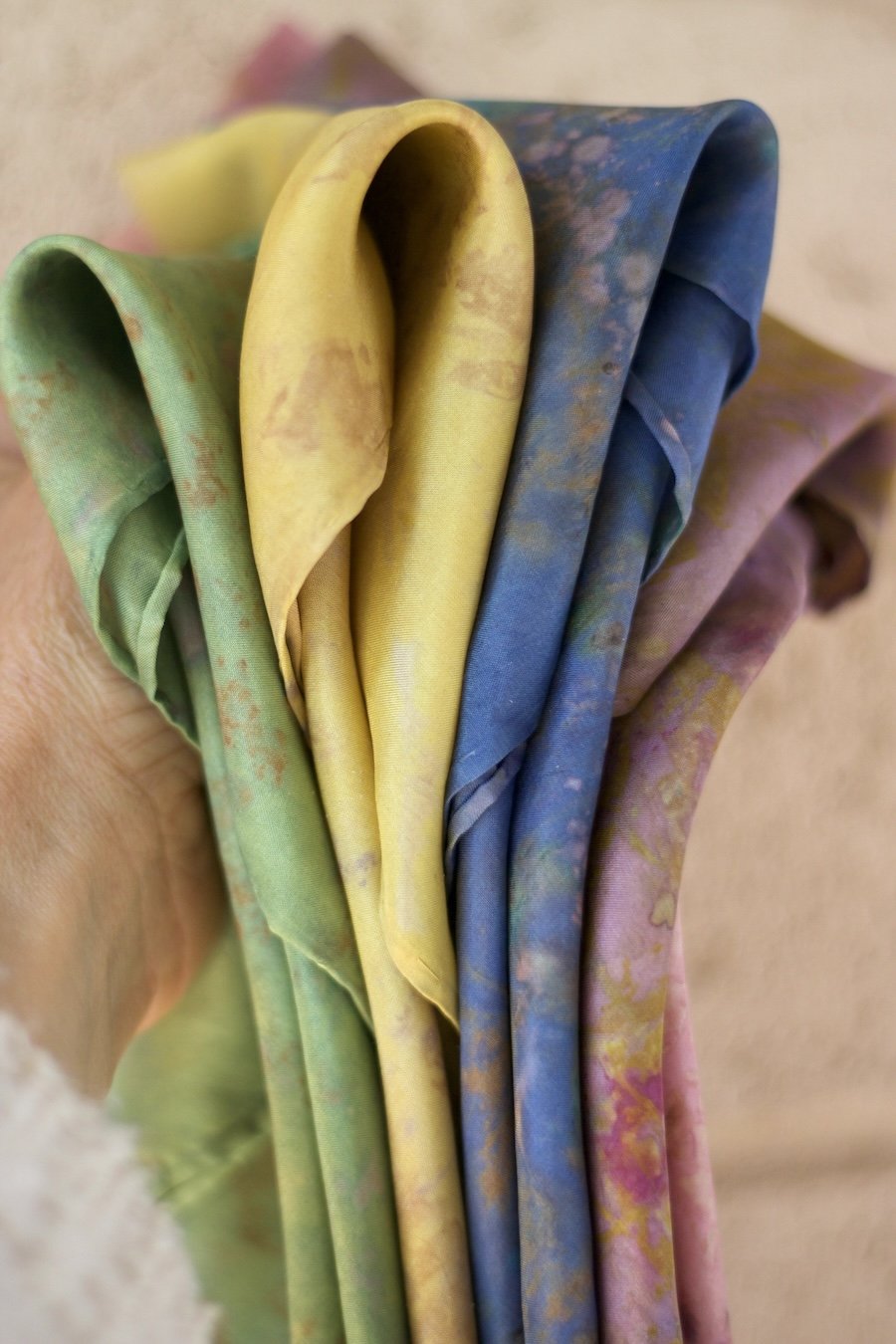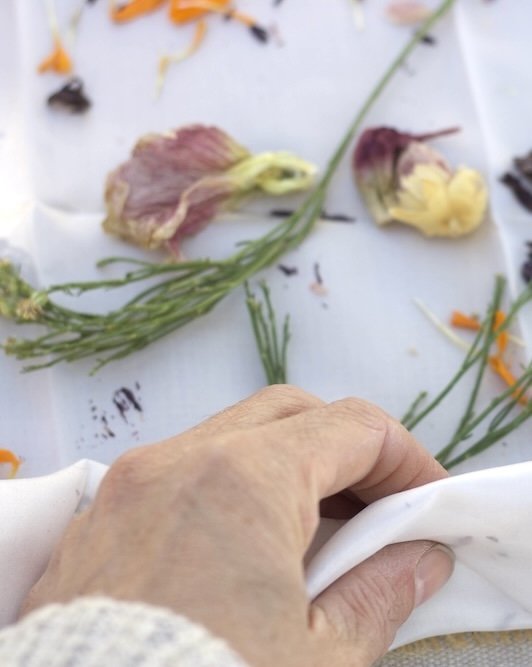 Image 1 of 5
Image 1 of 5

 Image 2 of 5
Image 2 of 5

 Image 3 of 5
Image 3 of 5

 Image 4 of 5
Image 4 of 5

 Image 5 of 5
Image 5 of 5






Abstract Silk Scarf Dyeing Workshop - March 15
March 15, 2025 | 10 a.m. - 1 p.m.
Class Level: Beginner
Class Description
The world of natural dyes opens one up to a variety of print possibilities using plants, but abstract prints still remain my favorites to create on silk scarves. Beyond basic bundle dyeing (wrapping plants in fabric to create unique prints), in my dye practice, I use a combination of a few base dyes to create chemical reactions with a variety of plants that leave whimsical abstract prints and patterns on my scarves.
In this workshop, participants will dye two beautiful silk scarves using a medley of hand-crafted natural dyes and botanicals. I will gently lead you to create two scarves using the techniques that I use to create my silk scarf collections. We will combine time-tested natural dyes with fugitive materials (those that aren’t colorfast) to create chemical reactive prints that push the boundaries of our perceptions around the usefulness of certain plants.
The shades of the finished scarves will depend on the dyes used. Participants can shift the colors to their own tastes by making simple alterations. We will also learn the fundamentals of how to care for our naturally dyed silk and iron them smooth without wrinkles for immediate wear.
We Will Explore:
Base dyes that develop undertone colors on silk.
Post-dyes that develop overtone colors on silk.
How to spread, wrap, tie, and bundle plants to create even and consistent patterns.
A gentle introduction to how certain plants (even ones without plant pigment) chemically react to base dyes.
An introduction to dyeing with primary color dyes indigo (blue), cochineal beetles (pink/red), and African sumac (yellow).
We Will Work With :
Pre-mordanted lightweight silk
My favorite botanical ingredients, including: eucalyptus bark, white hydrangea, rose, and snow chrysanthemum.
Base dyes: Cochineal and African sumac dyes
Post dyes: Indigo
Students Will Take Home:
Two silk scarves
Housekeeping
This class will be taught in the garden outside at my studio in Midtown Tucson (Close to Monsoon Chocolate). I will email the address and additional details to participants the week of the class.
Please wear appropriate clothing to work outside on a March morning, that you do not mind getting stained (spills happen).
Water and tea will be provided. You’re encouraged to bring what you need to keep comfortable. There is a lot of downtime during the natural dye process. Students will have time between activities to socialize and dye at their own pace. I provide all materials, you do not need to bring anything unless it excites you.
Parking
Street parking is available. If you require closer entry, contact me ahead of time to park in the driveway and I will make sure to save that spot for you.
Accessibility
My studio is located up a gravel driveway and a short distance over uneven ground in a small garden. To step inside the structure, one must walk up a ramp that is not wheelchair accessible. Please contact me if you require assistance.
Cancellation Policy
Due to the nature of being a very small business, I’m not able to offer refunds on classes at this time. To avoid needing to cancel, please check your schedule ahead of signing up for a class. If a class is booked for an additional date, I’m happy to move a participant to the later date to accommodate for life’s unexpected challenges. If your schedule interferes with a class, please give me as much notice as possible so that I might fill your spot. Special considerations will be made on a case by case basis for true emergencies (ex. sudden hospitalization, family or pet emergencies, or natural or man-made disasters, etc).
Liability
All participants must sign a liability waiver for the workshop.
Participants must be over 18 or accompanied by an adult who takes full responsibility for them on the premises and during our class.
No pets please :)
***Please note, this class involves multiple different animal-products, including silk and dye made from cochineal beetles.
March 15, 2025 | 10 a.m. - 1 p.m.
Class Level: Beginner
Class Description
The world of natural dyes opens one up to a variety of print possibilities using plants, but abstract prints still remain my favorites to create on silk scarves. Beyond basic bundle dyeing (wrapping plants in fabric to create unique prints), in my dye practice, I use a combination of a few base dyes to create chemical reactions with a variety of plants that leave whimsical abstract prints and patterns on my scarves.
In this workshop, participants will dye two beautiful silk scarves using a medley of hand-crafted natural dyes and botanicals. I will gently lead you to create two scarves using the techniques that I use to create my silk scarf collections. We will combine time-tested natural dyes with fugitive materials (those that aren’t colorfast) to create chemical reactive prints that push the boundaries of our perceptions around the usefulness of certain plants.
The shades of the finished scarves will depend on the dyes used. Participants can shift the colors to their own tastes by making simple alterations. We will also learn the fundamentals of how to care for our naturally dyed silk and iron them smooth without wrinkles for immediate wear.
We Will Explore:
Base dyes that develop undertone colors on silk.
Post-dyes that develop overtone colors on silk.
How to spread, wrap, tie, and bundle plants to create even and consistent patterns.
A gentle introduction to how certain plants (even ones without plant pigment) chemically react to base dyes.
An introduction to dyeing with primary color dyes indigo (blue), cochineal beetles (pink/red), and African sumac (yellow).
We Will Work With :
Pre-mordanted lightweight silk
My favorite botanical ingredients, including: eucalyptus bark, white hydrangea, rose, and snow chrysanthemum.
Base dyes: Cochineal and African sumac dyes
Post dyes: Indigo
Students Will Take Home:
Two silk scarves
Housekeeping
This class will be taught in the garden outside at my studio in Midtown Tucson (Close to Monsoon Chocolate). I will email the address and additional details to participants the week of the class.
Please wear appropriate clothing to work outside on a March morning, that you do not mind getting stained (spills happen).
Water and tea will be provided. You’re encouraged to bring what you need to keep comfortable. There is a lot of downtime during the natural dye process. Students will have time between activities to socialize and dye at their own pace. I provide all materials, you do not need to bring anything unless it excites you.
Parking
Street parking is available. If you require closer entry, contact me ahead of time to park in the driveway and I will make sure to save that spot for you.
Accessibility
My studio is located up a gravel driveway and a short distance over uneven ground in a small garden. To step inside the structure, one must walk up a ramp that is not wheelchair accessible. Please contact me if you require assistance.
Cancellation Policy
Due to the nature of being a very small business, I’m not able to offer refunds on classes at this time. To avoid needing to cancel, please check your schedule ahead of signing up for a class. If a class is booked for an additional date, I’m happy to move a participant to the later date to accommodate for life’s unexpected challenges. If your schedule interferes with a class, please give me as much notice as possible so that I might fill your spot. Special considerations will be made on a case by case basis for true emergencies (ex. sudden hospitalization, family or pet emergencies, or natural or man-made disasters, etc).
Liability
All participants must sign a liability waiver for the workshop.
Participants must be over 18 or accompanied by an adult who takes full responsibility for them on the premises and during our class.
No pets please :)
***Please note, this class involves multiple different animal-products, including silk and dye made from cochineal beetles.
March 15, 2025 | 10 a.m. - 1 p.m.
Class Level: Beginner
Class Description
The world of natural dyes opens one up to a variety of print possibilities using plants, but abstract prints still remain my favorites to create on silk scarves. Beyond basic bundle dyeing (wrapping plants in fabric to create unique prints), in my dye practice, I use a combination of a few base dyes to create chemical reactions with a variety of plants that leave whimsical abstract prints and patterns on my scarves.
In this workshop, participants will dye two beautiful silk scarves using a medley of hand-crafted natural dyes and botanicals. I will gently lead you to create two scarves using the techniques that I use to create my silk scarf collections. We will combine time-tested natural dyes with fugitive materials (those that aren’t colorfast) to create chemical reactive prints that push the boundaries of our perceptions around the usefulness of certain plants.
The shades of the finished scarves will depend on the dyes used. Participants can shift the colors to their own tastes by making simple alterations. We will also learn the fundamentals of how to care for our naturally dyed silk and iron them smooth without wrinkles for immediate wear.
We Will Explore:
Base dyes that develop undertone colors on silk.
Post-dyes that develop overtone colors on silk.
How to spread, wrap, tie, and bundle plants to create even and consistent patterns.
A gentle introduction to how certain plants (even ones without plant pigment) chemically react to base dyes.
An introduction to dyeing with primary color dyes indigo (blue), cochineal beetles (pink/red), and African sumac (yellow).
We Will Work With :
Pre-mordanted lightweight silk
My favorite botanical ingredients, including: eucalyptus bark, white hydrangea, rose, and snow chrysanthemum.
Base dyes: Cochineal and African sumac dyes
Post dyes: Indigo
Students Will Take Home:
Two silk scarves
Housekeeping
This class will be taught in the garden outside at my studio in Midtown Tucson (Close to Monsoon Chocolate). I will email the address and additional details to participants the week of the class.
Please wear appropriate clothing to work outside on a March morning, that you do not mind getting stained (spills happen).
Water and tea will be provided. You’re encouraged to bring what you need to keep comfortable. There is a lot of downtime during the natural dye process. Students will have time between activities to socialize and dye at their own pace. I provide all materials, you do not need to bring anything unless it excites you.
Parking
Street parking is available. If you require closer entry, contact me ahead of time to park in the driveway and I will make sure to save that spot for you.
Accessibility
My studio is located up a gravel driveway and a short distance over uneven ground in a small garden. To step inside the structure, one must walk up a ramp that is not wheelchair accessible. Please contact me if you require assistance.
Cancellation Policy
Due to the nature of being a very small business, I’m not able to offer refunds on classes at this time. To avoid needing to cancel, please check your schedule ahead of signing up for a class. If a class is booked for an additional date, I’m happy to move a participant to the later date to accommodate for life’s unexpected challenges. If your schedule interferes with a class, please give me as much notice as possible so that I might fill your spot. Special considerations will be made on a case by case basis for true emergencies (ex. sudden hospitalization, family or pet emergencies, or natural or man-made disasters, etc).
Liability
All participants must sign a liability waiver for the workshop.
Participants must be over 18 or accompanied by an adult who takes full responsibility for them on the premises and during our class.
No pets please :)
***Please note, this class involves multiple different animal-products, including silk and dye made from cochineal beetles.
